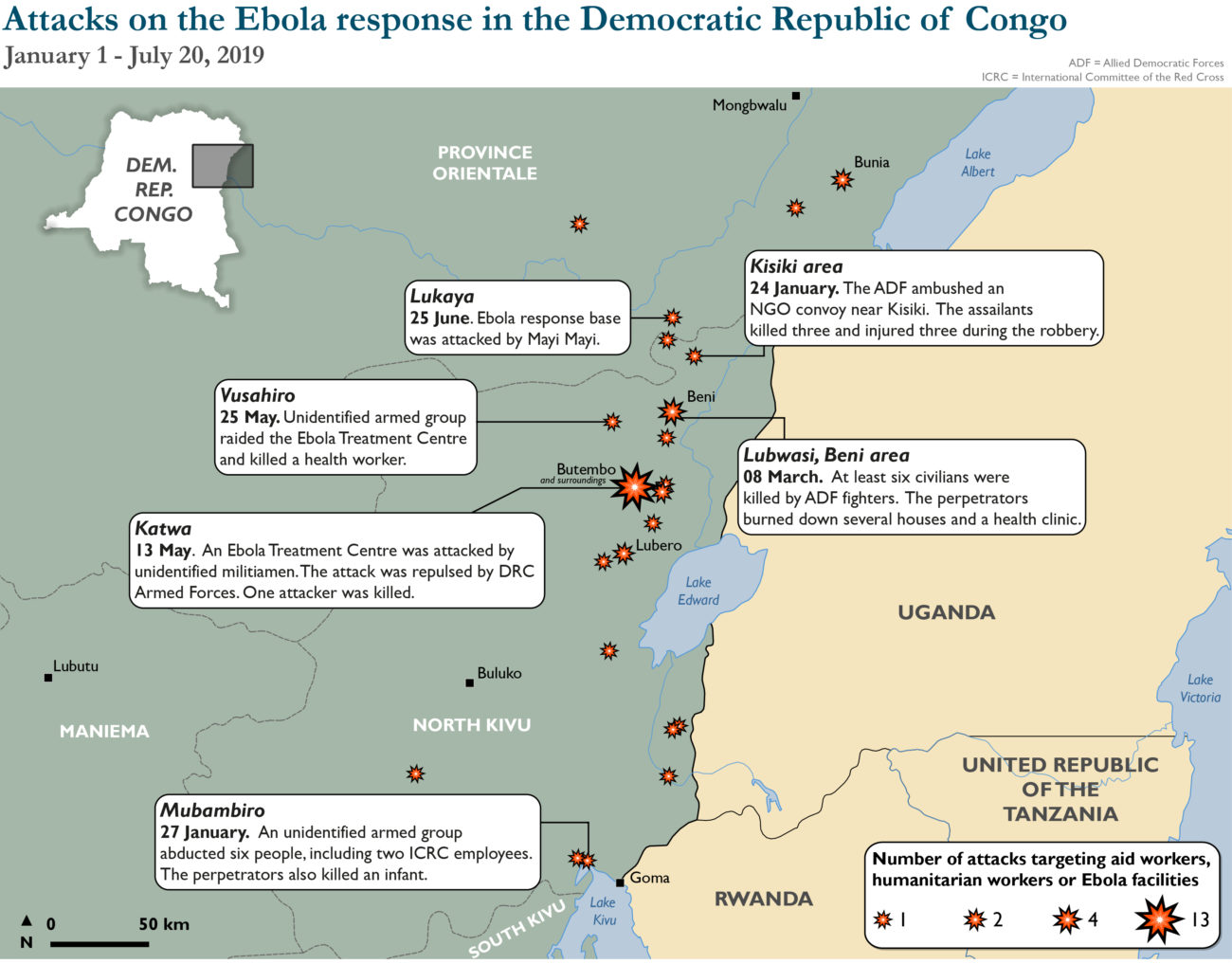25 July 2019: An upsurge in subregional conflict, an outbreak of the Ebola virus, and a contentious election combined to make 2018 one of the most violent years on record for the Democratic Republic of Congo (DRC). Six months into the new presidency of Felix Tshisekedi, ACLED data show that overall political violence is rising at even higher rates than last year, at the conclusion of Joseph Kabila’s nearly 20-year rule. The subnational regions most devastated by Ebola simultaneously face the highest concentration of violence, with increased communal conflict and attacks targeting aid workers undermining the public health response.
Overall Political Violence under Tshisekedi (25 January 2019-20 July 2019)
- ACLED records nearly 790 organized political violence events across more than 420 locations in the DRC since Tshisekedi’s inauguration on 24 January 2019
- Nearly 1,900 total conflict-related fatalities are reported in connection with these events, including over 760 fatalities from violence targeting civilians *
- Violence has grown and spread throughout the first six months of Tshisekedi’s presidency
- During the same period in 2018 under Tshisekedi’s predecessor, Joseph Kabila, ACLED recorded almost 630 organized political violence events across nearly 260 locations, resulting in approximately 500 reported fatalities
- Under both presidents, violence against civilians during these periods accounted for approximately 50% of all political violence
- The highest levels of political violence since Tshisekedi’s inauguration have occurred in the North Kivu, South Kivu, and Ituri provinces, with 50% of all political violence events taking place in North Kivu during this period, 23% in South Kivu, and 13% in Ituri
- Unidentified or anonymous armed groups are responsible for the majority of attacks on civilians so far this year, with over 200 recorded events
- State forces engaged in the most battles, followed by unidentified or anonymous armed groups, the Allied Democratic Forces (ADF), and the Nduma Defense of Congo- Renove faction (NDC-Renove)
In Focus: Attacks on the Ebola Response
- The DRC’s Ebola epidemic extends across two of the country’s most violent provinces, North Kivu and Ituri, making it the world’s first outbreak to occur in an active conflict zone
- Aggravating the effects of overall insecurity, the public health response has increasingly come under direct attack: ACLED records over 40 violent events involving health and aid workers in North Kivu and Ituri since the beginning of 2019
- Many events are reported in North Kivu’s Beni and Butembo regions, which is the epicenter of the Ebola outbreak
- The Beni region continues to face broader conflict, with over 80 political violence events since January 2019 resulting in over 140 reported fatalities
- Many events are reported in North Kivu’s Beni and Butembo regions, which is the epicenter of the Ebola outbreak
- Unidentified or anonymous armed groups are responsible for over half of all attacks on health and aid workers in North Kivu and Ituri
- ACLED also records eight events in which violent mobs targeted Ebola-related health facilities since January 2019, underscoring the response’s continued struggle to gain community acceptance and support
In Focus: Communal Violence in Ituri
- In June 2019, ACLED recorded a surge in violence against civilians in Ituri province, particularly in the Djugu territory
- Over 360 civilian fatalities were reported between 1 June 2019 and 20 July 2019
- Lendu ethnic militias were responsible for 57% of these fatalities, while unidentified ethnic militias were responsible for 28%
- Much of the violence targeted the Hema community
- During the same period, ACLED recorded 24 clashes in the province, 95% of which involved state military forces
- The violence has displaced over 300,000 people, and at least 10 internally displaced persons (IDPs) were reported killed by unidentified groups during the first week of July
In Focus: NDC-Renove/Guidon Activity
- The NDC-Renove — led by Guidon Mwissa, a militia commander who faces UN sanctions for alleged war crimes — has continued to clash with other armed groups as it expands its territory across Masisi, Lubero, Rutshuru, and Walikale
- The militia often targets Hutu armed groups and pushed National Council for Renewal and Democracy (CNRD) forces from the region, according to a recent UN Group of Experts report
- Allegedly allied with the Armed Forces of the Democratic Republic of the Congo (FARDC), the NDC-Renove is often left unopposed in the territory it gains, facilitating frequent human rights abuses
- From July 2018 to the present, the NDC-Renove has been responsible for 17 attacks on civilians, resulting in over 40 reported fatalities
- The group also engaged in 56 armed clashes, resulting in more than 220 reported fatalities
A US-based 501c3 established in 2014, ACLED is the highest quality, most widely used, real-time data and analysis source on political violence and protest around the world.
If you would like to use ACLED analysis or visuals, please review our Terms of Use and Attribution Policy.
For interview requests and press inquiries, please contact:
Sam Jones, Communications Manager
*This figure includes both events under ACLED’s ‘Violence against civilians’ event type, as well as events under the ‘Explosions/Remote violence’ event type wherein civilians were determined to be the primary target. ACLED only records civilian fatalities that are reported in connection with these event types and in which they are directly targeted for violence. Reported civilian fatality figures do not include fatalities from attacks where civilians are not the primary target, such as ‘collateral’ civilian fatalities.
___________
Download a PDF of this fact sheet here.
___________





